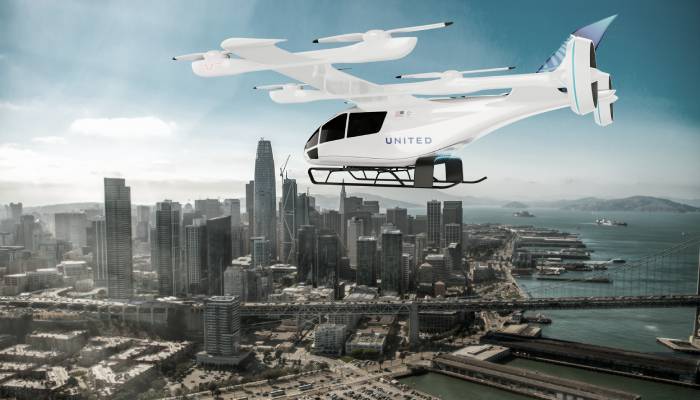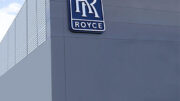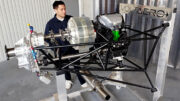VoltAero defines the future of sustainable aviation with its Paris Air Show world debut of the Cassio 330 electric-hybrid aircraft
Le Bourget, France, June 18, 2023 – VoltAero today unveiled the first Cassio 330 electric-hybrid aircraft, marking a major step toward aviation’s goal of decarbonization and sustainable mobility by introducing the first member in an airplane family that brings together a clean-sheet airframe design with a proprietary hybrid propulsion system.
The no. 1 Cassio 330 prototype is shown on VoltAero’s Paris Air Show exhibit stand at Le Bourget Airport.
This no. 1 Cassio 330 prototype was introduced during a press conference with international journalists on VoltAero’s exhibit stand at the Paris Air Show (Static display area, Exhibit Zone B4).
“Today marks a true milestone for electric aviation, as VoltAero delivers on its promise to take an all-new approach for quiet, efficient and eco-friendly transportation that is based on a hybrid design combining thermal and electric propulsion for maximum flight safety,” said Jean Botti, VoltAero’s CEO and Chief Technical Officer. “I want to thank my VoltAero team for its dedication and tireless work in reaching this historic moment, as well as express my appreciation to our suppliers and partners for their commitment to Cassio.”
The no. 1 Cassio 330 prototype is targeted to perform its maiden flight in late 2023. This aircraft will be used to validate the overall airframe configuration and aerodynamics of VoltAero’s all-new design for Cassio, and will be powered by a four-cylinder Kawasaki Motors thermal engine derived from the Japanese company’s proven motorcycle engine products.
It will be followed by the no. 2 Cassio 330’s maiden flight in the second quarter of 2024. This aircraft will be used for the airworthiness certification program, and is to be equipped with VoltAero’s full-up hybrid propulsion unit – composed of the four-cylinder Kawasaki Motors thermal engine (with a peak power rating of 165 kW) and a Safran ENGINeUSTM smart electric motor (with a peak power rating of 180 kW).
VoltAero has selected AKIRA Technologies for the integration and validation of Cassio’s hybrid propulsion unit. This French company – which is specialized in the design and production of energy conversion systems and test benches – has been given the responsibility by VoltAero for design and development of the Cassio hybrid propulsion unit’s gearbox, along with the unit’s mechanical integration and ground testing, as well as test/adaptation of the Kawasaki thermal engine and Safran electric motor.
The no. 2 Cassio 330 prototype also will have the full-definition avionics suite from Avidyne, integrating a glass cockpit with new-generation Quantum 14-inch displays for single pilot operation, and which is specifically designed for the connected aircraft environment. Based on its agreement with VoltAero, the U.S.-based Avidyne will perform exclusive development in tailoring the avionics for the power management of Cassio’s hybrid propulsion unit. At the Paris Air Show, VoltAero’s exhibit stand includes the Avidyne cockpit panel configuration, highlighting its dual PFD/MFD (Primary Flight Display/Multifunction Display) layout with 4K resolution.
The Cassio 330 will have a four/five-seat interior configuration, followed by the six-seat Cassio 480 with a combined electric-hybrid propulsion power of 480 kilowatts, and the Cassio 600 – which is to be sized at a 10/12-seat capacity with electric-hybrid propulsion power of 600 kilowatts. The Cassio 480 will utilize Kawasaki Motors’ six-cylinder thermal engine.
Cassio will fly with sustainable aviation fuel and hydrogen
VoltAero also is pursuing the application of sustainable fuels for Cassio’s hybrid propulsion unit, including biofuel and hydrogen. Currently, VoltAero’s Cassio S testbed aircraft is performing flight validations of VoltAero’s hybrid power unit with biofuel. And as part of its Paris Air Show exhibit, VoltAero is displaying a Kawasaki Motors thermal engine that operates with liquid hydrogen, which will be used on Cassio 330 aircraft in the future.
The Cassio family will be a highly capable and reliable product line for regional commercial operators, air taxi/charter companies, private owners, as well as in utility-category service for cargo, postal delivery and medical evacuation (Medevac) applications.
By integrating VoltAero’s patented electric-hybrid propulsion system into the purpose-designed airframe, Cassio will deliver an order of magnitude higher performance as compared to the current competition, and provide significantly lower operational costs.
The VoltAero propulsion concept is unique: Cassio aircraft will utilize an electric motor in the aft fuselage-mounted hybrid propulsion unit for all-electric power during taxi, takeoff, primary flight (if the distance traveled is less than 150 km.), and landing. The hybrid feature – with an internal combustion engine – comes into play as a range extender, recharging the batteries while in flight. Additionally, this hybrid element serves as a backup in the event of a problem with the electric propulsion, ensuring true fail-safe functionality.
VoltAero will assemble the Cassio aircraft in a purpose-built facility at the Rochefort Charente-Maritime Airport in France’s Nouvelle-Aquitaine region.
About VoltAero (www.voltaero.aero)
VoltAero is taking electric aircraft to an entirely new level. Benefitting from 80-plus years of combined pioneering expertise, VoltAero is developing a truly unique general aviation airplane family, Cassio, for safe, quiet, efficient and eco-friendly flight in electric and electric-hybrid modes.
Cassio aircraft will be assembled in a purpose-built facility at Rochefort Airport in the Nouvelle-Aquitaine region of France.
Source: VoltAero








Be the first to comment on "VoltAero defines the future of sustainable aviation"